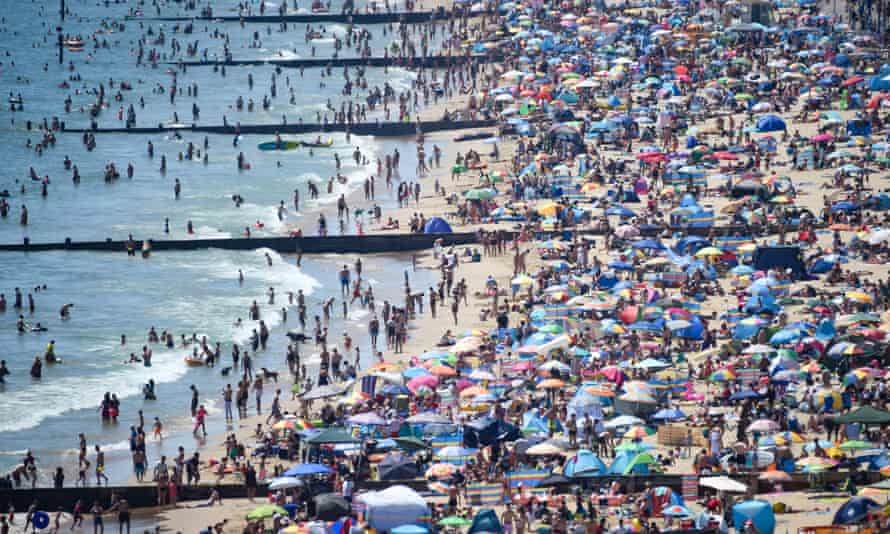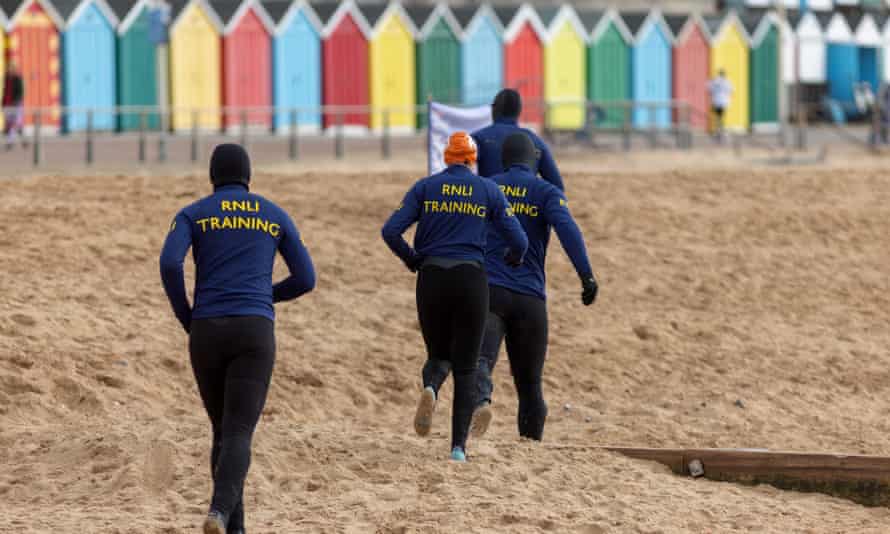She had just paddled 100 metres out to sea, manoeuvred an awkward 70kg dummy on to her rescue board and zipped back to shore.
But Emily Fazakarley, a Royal National Lifeboat Institution lifeguard at Boscombe beach in Dorset, was beaming and not at all out of breath.
“It was a bit chilly but fun,” she said. “I’ve been coming down and getting into the water since the new year so I’m used the temperature. Hopefully by the time we start here properly the water will be a bit warmer, but we’ll be ready no matter what.”
RNLI lifeguards in Dorset and across the UK are preparing hard for what will almost certainly be their busiest ever spring and summer.
A major incident was declared on the beaches of Bournemouth, Boscombe and Poole last June when half a million people desperate for a day out after lockdown suddenly descended on the resorts.
“It was a bit crazy,” said Fazakarley, 21, who is doing her third season as a lifeguard. “It was so intense. You were having to try to take care of so many people, plus keeping an eye on your own team. I think it will be the same again this year, or even busier.”

Confusing signals over whether people will be able go on holiday abroad this summer means that seaside spots are likely to enjoy, or endure, their busiest seasons ever.
The holiday rental company Awaze sold 10,000 UK breaks in one day recently, and seaside accommodation prices have risen by an average of 35% according to the consumer group Which?.
Police forces and local authorities across the country are drawing up plans to cope with the post-lockdown rush.
Bournemouth, Christchurch and Poole council has predicted “exceptional numbers” and is bringing in “covid marshalls”, drones to monitor crowds and a park-and-ride scheme in response.
All of which means that lifeguards like Fazakarley will be super-busy.
On Friday she and three of her colleagues were undertaking “fitness and competencies” tests. The first task was a “run, swim, run” – a 200-metre run along the beach – tricky because tonnes of new sand has just been brought in – followed by a 200-metre swim in Poole Bay and another 200-metre run. They have to do it in under eight minutes.

Then comes the paddle out to the dummy, who is nicknamed Fred. In non-Covid times the lifeguards “rescue” each other. Fred tends to be more tricky to save because he is not flexible and does not help out. Then they practice CPR and signalling skills.
RNLI lifeguards saved 110 lives and aided 25,172 people in 10,687 incidents in 2020, ranging from water rescues to providing first aid and reuniting children with families.
The charity will deliver its services across the UK and the Channel Islands in its normal phased approach this year. Patrols will begin at 50 beaches from the start of the Easter holidays with the number increasing until peak summer holiday time when more than 240 beaches are covered.
Kester Sheppard, the lead lifeguard supervisor for east Dorset, said: “We know we have to hit the ground running from day one. If the weather is fine on Good Friday it could be busy immediately. We’re up for it.”
He does not criticise anyone for being drawn to the sea. “We completely understand why people want to come out of the cities to places like this,” he said.
But he also urged people to plan ahead and respect the water. Sheppard is particularly concerned that with people champing at the bit to escape lockdown this year they could be tempted into chilly water early in the season. The water off Boscombe beach was 7Con Friday. “Cold water shock is a real issue,” he said, describing a condition which can cause breathing difficulties, panic and even heart attacks.
There are a team of 100 lifeguards along the east Dorset beaches, aged between 18 and 70.
Chris Chadwick, who is in his 12th year as a lifeguard, works as a musician or camera operator and usually does casual shifts for the RNLI. The impact of the pandemic on his other jobs means that he will be doing more hours on the beach this year.
He has surfed all winter so the coolness of the water is not an issue. “But I’m looking forward to the summer,” he said. “I think there’ll be enough people around to keep us busy.”
This content first appear on the guardian
